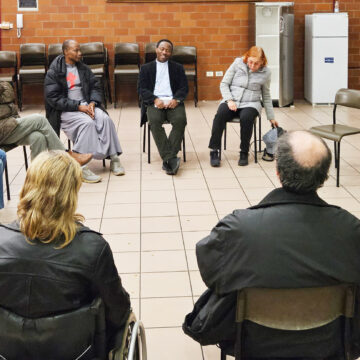 The Patience that is Born from Love
The Patience that is Born from Love
Mercy is concrete and visible love. It is expressed through works that meet the old and new needs of people. The spiritual works of mercy invite us to pay attention in particular to the quality of our daily relationships with people. I spoke about this in my book Un cuore attento (‘An Attentive Heart’) when reflecting upon mercy and compassion.
My curiosity was aroused in particular by one work of mercy: bearing wrongs patiently. This work of mercy is not easy to implement. People who in various ways ‘do us wrong’ are never absent. To tell the truth, ‘wrongs’ are a part of life and are not always connected with people. However, we should not fail to pay attention to the ‘patience’ that we are advised to have and to the suffering that all of this can involve. Bearing wrongs patiently focuses our attention on ‘burdensome’ people because they annoy us, they disturb us, they are unpleasant.
People of this kind can be placed in various categories. Christian Albini describes them in his short book Sopportare pazientemente le persone moleste (‘Patiently Bearing People who do us Wrong’). There are those who are ‘injurious’ and not only provoke disturbance through their invasiveness but also, and above all else, through their lack of respect; those who engage in talk that is not very attentive to the suffering of other people: these are the people whom Job calls ‘irksome comforters’. Then there are the ‘uncomfortable’ people who disturb our settled lives and our forms of selfishness with their requests for justice. There are also those who ‘provoke’ us and whose very presence is disturbing: they are people on the social fringes who are a provocation as regards our responsibilities. Then there are those people whom we see as ‘detestable’ because they are different because of their identities, their beliefs, and their forms of behaviour. These are people who disturb us in various ways and whom we seek to keep at a distance.
And so what should we do with troublesome people? If there is a hope that the people who ‘do us wrong’ can change, it can be enough to point things out to them; to tell them that they are disturbing us; that friends do not behave like that; that all of this complicates their own lives and their relationships with other people. At other times the only thing we can do is to distance ourselves from them or make them understand in a clear way that limits exist, that ‘boundaries’ have to be respected. A third way is to bear the person as he or she is. This is what St. Paul suggests: ‘Bear each other’s burdens’. But this reminds us that we, too, can do wrong to other people. And thus the bearing of wrongs must be reciprocal. For that matter, families, friendships and communities can only resist if this is done.
The difficulty of this work of mercy lies in the virtue of patience which is not something that is purely passive, that makes us accept everything without moving a finger or speaking out. Patience invites us to bear the impact of wrongs (people or situations) but also to resist when confronted with hostility and not to forgo fighting against what is not only a ‘wrong’ but also authentic injustice. ‘To those who do you wrong’, we are advised by Anselm Grün – ‘do not give so much power. Keep steady. Display a capacity for resistance. Do not collapse! Keep standing, without bending. I am allowed to be who I am with a brother who does me wrong, with a sister who is irksome, but do not allow yourselves to be conditioned by them. Be on their side but do not bear the all of their burden yourselves because it is their task to bear that burden. Help them to bear their burdens because these people should have their place in the community but do not allow the community to be shaped by them: that would only lead to the community being crushed’.
The other works of mercy invite us ‘to act’. This work of mercy seems only passive. But such is not the case. To bear means effort, activity, resistance, control, hope that things will change, doing what it is possible to do for this to take place. Patience involves a ‘suffering’ that will bear fruit because it is born from love.
We should not forget that at times people trouble us because after a certain fashion they awaken inside us something that is ‘wrong’ that dwells inside us, and which after a certain fashion we had removed and forgotten. And what troubles us is often our limitations and our frailties. A patient bearing of the other who is seen to be irksome goes hand in hand with patience towards ourselves.
Knowing how to resist in the face of the ‘wrongs’ and the sufferings of life, knowing how to face up to them and bear them ‘actively’, with the help of other people (or Another Person) as well, can lead to the discovery within us of forces that we did not believe that we possessed and to becoming better people.
Luciano Sandrin















Camillians on Facebook
Camillians on Twitter
Camillians on Instagram